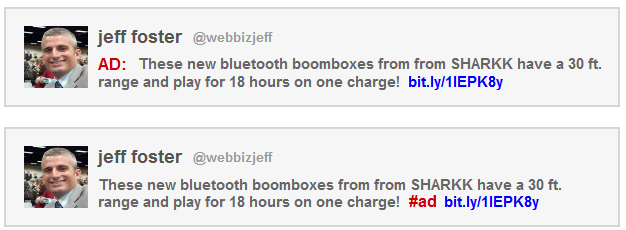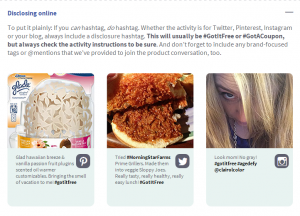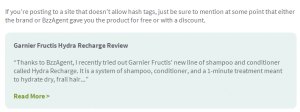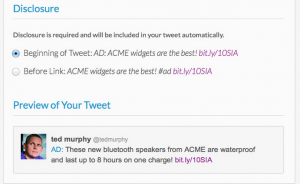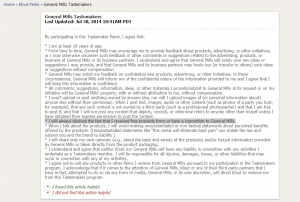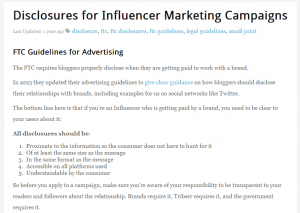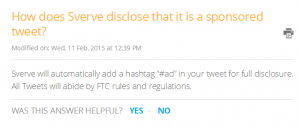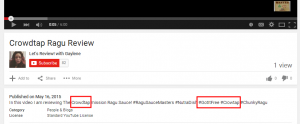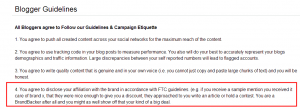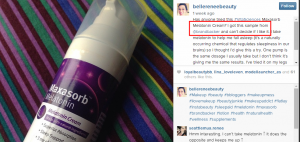Key Findings From Research
1. Best Way To Disclose a Social Post:
2. Best Way To Disclose a Blog Post:
Unknown from the research, please see this post disclosing sponsored blog posts.
Examples of FTC Disclosure for Free Reviews & Sponsored Posts
Many bloggers & social media stars know they need to disclose something when they received a product for free or were paid to write a review. But, there is so much confusion out there on what actually needs to be disclosed. Lets look at how the major players in the influencer marketing industry recommend to do it:
BzzAgent
BzzAgent disclosure policy recommends always doing a #hashtag, even on your blog. If you got a product for free they recommend the #hashtag #gotitforfree. That makes sense, whether you write a blog or posted on Instagram, your users will know that you got a product for free from that tag. Here is a big yellow button you could add to the top of your blog post to help your users clearly indicate that you got the product for free.
BzzAgent also recommends if you can’t use a #hashtag (not sure what would prevent you from using a #hashtag) that you would want to mention at some point that you received the product for free from BzzAgent or the brand.
I see many of BzzAgents Influencers disclosing their relationship with BzzAgent on social channels like Instagram. Which makes sense because Bzzagent is shipping out the products to the influencers, and not the brands. But I do not see anything on BzzAgent’s site requiring that.
IZEA
IZEA disclosure policy is automated. Meaning you have to choose one of their methods of disclosing. Which means they must be very confident these two methods of disclosing a product are correct. Considering that the FTC .com’s disclosure guidelines recommend them you can be confident they are sufficient disclosures. What are they?
As their picture shows, you need to put the word “AD:” before the post or #ad before the outbound link in your post. That seems pretty easy. That format would work for Twitter, Facebook, Instagram, Pinterest, Vine, YouTube and pretty much every other social network. Could it would for a blog?
Many blogger get ‘lost in the details.’ The FTC just wants you to make it clear to your readers that you got a product for free or were paid to promote the product folks. The principle is MAKE IT CLEAR. The law can be implemented any way you see fit. If you want a talking monkey to pop up and very clearly articulate to your readers you got a product for free, that is OK and would be very cool. Here are some ideas
KLOUT
Klout does not have an official public disclosure page. But one of their past perks stated this “I will always disclose the fact that I received free products from or have a connection to General Mills.” So it would seem that to large brands and to Klout want you to mention you received the product for free or have a relationship with the brand.
Which makes sense considering the FTC gives a specific example saying if a blogger obtained a product she is reviewing for free she must disclose the fact; and they want it visible. They want “disclosures must be prominent” and “not buried within a web page.”
I also see many of Klout’s Influencers disclosing their relationship with Klout on social channels like Instagram. Which makes sense because Klout also is shipping out the products to the influencers, and not the brands. But I do not see anything on Klout’s site requiring that.
Tibber
Tibber Public Disclosure Policy stresses transparency. Make the disclosure prominent so a user doesn’t have to hunt for it, same size and format as the message, accessible on all platforms, and understood by the consumer. No real specifics here.
Sverve
Sverve disclosure policy is similar to IZEA; they insert #ad in your tweets & social posts.
CrowdTap
CrowdTap fine print says the same as the rest when it comes to agreeing to the FTC guidelines. However it also says they must “Disclose Your Connection to Crowdtap and its Clients.” Which you can see they enforce by their many published examples on instagram and channels such as youtube:
I also see many of CrowdTap’s Influencers disclosing their relationship with CrowdTap on social channels like Instagram. Which makes sense because CrowdTap also is shipping out the products to the influencers, and not the brands. But I do not see anything on CrowdTap’s site requiring that.
BrandBacker
BrandBacker’s disclosure policy also mentions the FTC guidelines. They mention that ” if you receive a sample mention you received it care of brand x, that they were nice enough to give you a discount, they approached to you write an article or hold a contest.” Again, basic disclosure, let everyone know you received the product from the brand. Many of BrandBackers influencers disclose their relationship with BrandBacker.
Folks we could go on here. There are 100’s of influence marketplaces popping up. It is obvious on how to disclose a social post. Slap #ad in the post and you are solid. In regards to blog posts opinions very. My feeling is slapping a big image that says “Ad” or “GotITFree” or “Sponsored Ad” or “Sponsored Content” or “Sponsored Review” is just as good as writing out “I received this product for free in exchange for writing this post from brand XXX.” The later looks awful and is understood by the big yellow button that could be added.

